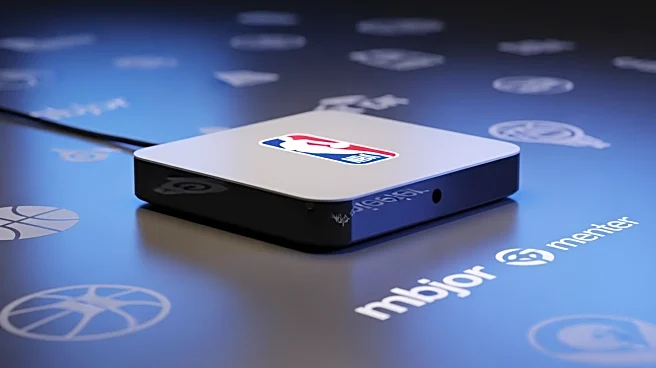What's Happening?
The NBA's 2025-26 season introduces a new media rights deal, marking the league's entry into the streaming era. This deal ends the NBA's association with TNT and brings games back to NBC, while also incorporating streaming services like Peacock and Prime
Video. ESPN's new direct-to-consumer streaming service is part of this transition, offering fans more national broadcasts but requiring subscriptions to multiple services. The deal includes 247 national broadcasts across Disney (ABC/ESPN), NBCUniversal (NBC/Peacock), and Amazon (Prime Video), significantly increasing the number of games available compared to previous seasons.
Why It's Important?
The shift to streaming services reflects broader changes in media consumption, where digital platforms are increasingly favored over traditional cable. This transition could enhance accessibility for fans, allowing them to watch games on various devices. However, it also introduces complexity, as fans must subscribe to multiple services to access all games. The deal benefits the NBA by expanding its reach and potentially increasing viewership, while streaming services gain valuable content to attract subscribers. This move may set a precedent for other sports leagues, influencing future media rights negotiations.
What's Next?
As the season unfolds, fans will adapt to the new viewing landscape, potentially influencing subscription trends and network strategies. The success of streaming services in delivering NBA content could lead to more exclusive streaming deals in the future. Networks may explore innovative ways to enhance viewer engagement, such as interactive features or personalized content. The integration of streaming services may prompt discussions on pricing models and accessibility, ensuring that fans can enjoy games without excessive costs.
Beyond the Headlines
The NBA's embrace of streaming services highlights the growing influence of digital platforms in sports media. This shift may encourage traditional networks to innovate and adapt to maintain competitiveness. The inclusion of tech companies like Amazon in sports broadcasting could lead to more tech-driven enhancements in coverage. Ethical considerations around data privacy and streaming service accessibility may arise, prompting discussions on consumer rights and digital inclusivity.















